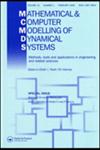Modelling the clogging of gas turbine filter houses in heavy-duty power generation systems
IF 1.8
4区 数学
Q3 COMPUTER SCIENCE, INTERDISCIPLINARY APPLICATIONS
Mathematical and Computer Modelling of Dynamical Systems
Pub Date : 2020-02-01
DOI:10.1080/13873954.2020.1713821
引用次数: 5
Abstract
ABSTRACT A prognostic approach based on a MISO (multiple inputs and single output) fuzzy logic model was introduced to estimate the pressure difference across a gas turbine (GT) filter house in a heavy-duty power generation system. For modelling and simulation of clogging of the GT filter house, nine real-time process variables (ambient temperature, humidity, ambient pressure, GT produced load, inlet guide vane position, airflow rate, wind speed, wind direction and PM10 dust concentration) were fuzzified using a graphical user interface within the framework of an artificial intelligence-based methodology. The results revealed that the proposed fuzzy logic model produced very small deviations and showed a superior predictive performance than the conventional multiple regression methodology, with a very high determination coefficient of 0.974. A complicated dynamic process, such as clogging phenomenonin heavy-duty GT system, was successfully modelled due to high capability of the fuzzy logic-based prognostic approach in capturing the nonlinear interactions.重型发电系统中燃气轮机过滤室堵塞建模
摘要介绍了一种基于多输入单输出模糊逻辑模型的预测方法,用于估计重型发电系统中燃气轮机(GT)过滤室的压差。为了对燃气轮机过滤室的堵塞进行建模和模拟,在基于人工智能的方法框架内,使用图形用户界面对九个实时过程变量(环境温度、湿度、环境压力、燃气轮机产生的负荷、入口导叶位置、气流速度、风速、风向和PM10粉尘浓度)进行了模糊化。结果表明,与传统的多元回归方法相比,所提出的模糊逻辑模型产生了非常小的偏差,并显示出优越的预测性能,具有非常高的决定系数0.974。由于基于模糊逻辑的预测方法在捕捉非线性相互作用方面的高能力,成功地对重型燃气轮机系统中的堵塞现象等复杂动态过程进行了建模。
本文章由计算机程序翻译,如有差异,请以英文原文为准。
求助全文
约1分钟内获得全文
求助全文
来源期刊
CiteScore
3.80
自引率
5.30%
发文量
7
审稿时长
>12 weeks
期刊介绍:
Mathematical and Computer Modelling of Dynamical Systems (MCMDS) publishes high quality international research that presents new ideas and approaches in the derivation, simplification, and validation of models and sub-models of relevance to complex (real-world) dynamical systems.
The journal brings together engineers and scientists working in different areas of application and/or theory where researchers can learn about recent developments across engineering, environmental systems, and biotechnology amongst other fields. As MCMDS covers a wide range of application areas, papers aim to be accessible to readers who are not necessarily experts in the specific area of application.
MCMDS welcomes original articles on a range of topics including:
-methods of modelling and simulation-
automation of modelling-
qualitative and modular modelling-
data-based and learning-based modelling-
uncertainties and the effects of modelling errors on system performance-
application of modelling to complex real-world systems.

 求助内容:
求助内容: 应助结果提醒方式:
应助结果提醒方式:


